October 29, 2025 | 05:16 GMT +7
October 29, 2025 | 05:16 GMT +7
Hotline: 0913.378.918
October 29, 2025 | 05:16 GMT +7
Hotline: 0913.378.918
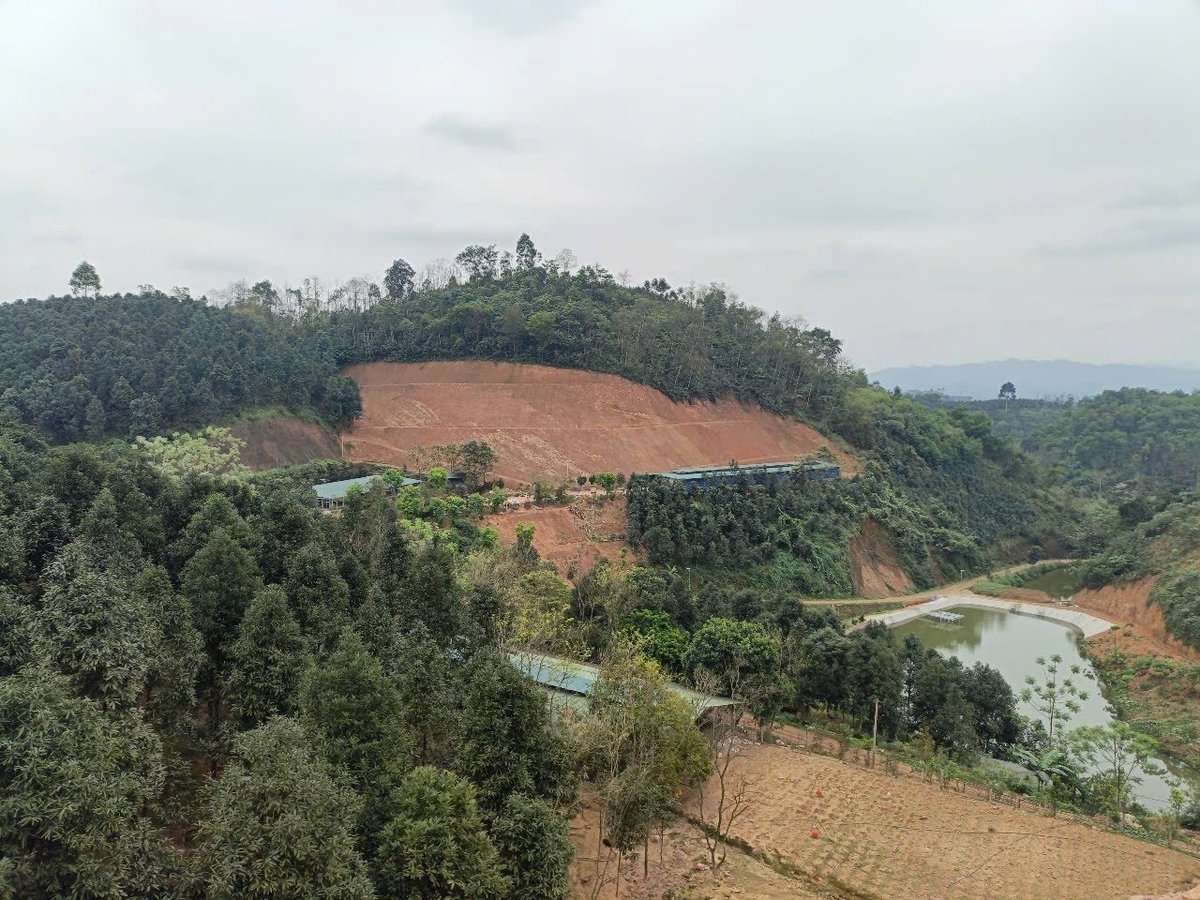
The chicken farms of MQ Livestock and Agricultural Services Cooperative are located on hills, surrounded by green forests. Photo: Thanh Tien.
We visited the MQ Livestock and Agricultural Services Cooperative (MQ Cooperative) in Tran Yen commune, Lao Cai province (formerly Minh Quan commune, Tran Yen district, Yen Bai province). Right at the entrance of the cooperative, there is a stone slab with large English words “Chicken Garden”. We were entering a livestock farm, but it felt as if we were walking along an ecological garden with flat concrete roads connecting the hills, and hidden in the green forest were farms with a scale of thousands of chickens.
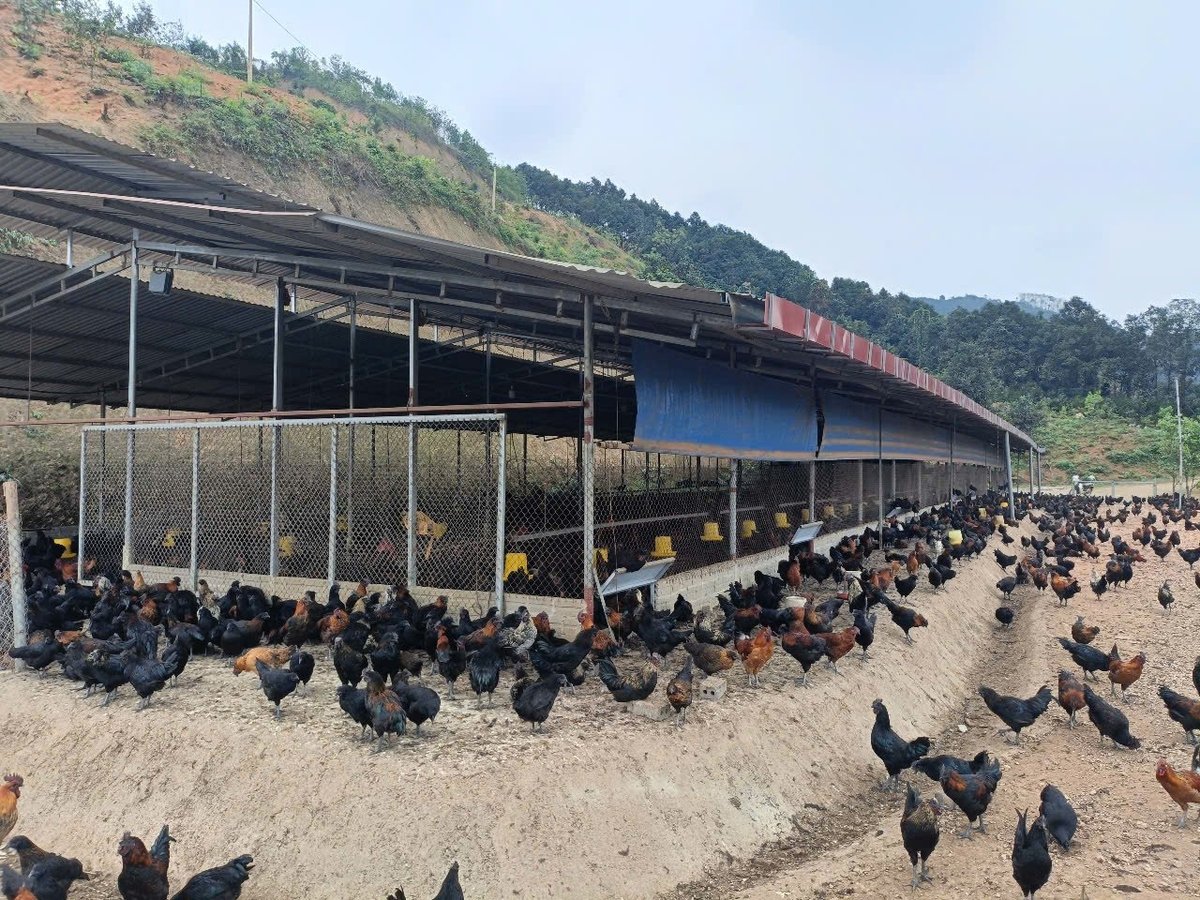
Each farm has a spacious yard for chickens to move around and find more feed from the natural environment. Photo: Thanh Tien.
According to Nguyen Tien Son, Director of MQ Cooperative, he started raising chickens on a scale of 300 chickens in 2011. After two batches, he saw the effectiveness and continued to expand to 500 chickens per batch. “At that time, a chicken farm with a scale of 500 chickens in the locality was already so large. A few years later, more and more households joined in the chicken farming model, gradually forming a group of chicken farmers in the form of a cooperative,” he said.
During the breeding process, households select the source of breeding stock together, support each other in building barns, choose feed, and vaccinate against diseases. By the end of 2017, the farmer group agreed to establish a cooperative. With the government's support and facilitation in terms of administrative procedures and land, in April 2018, the cooperative was officially launched with 10 members.
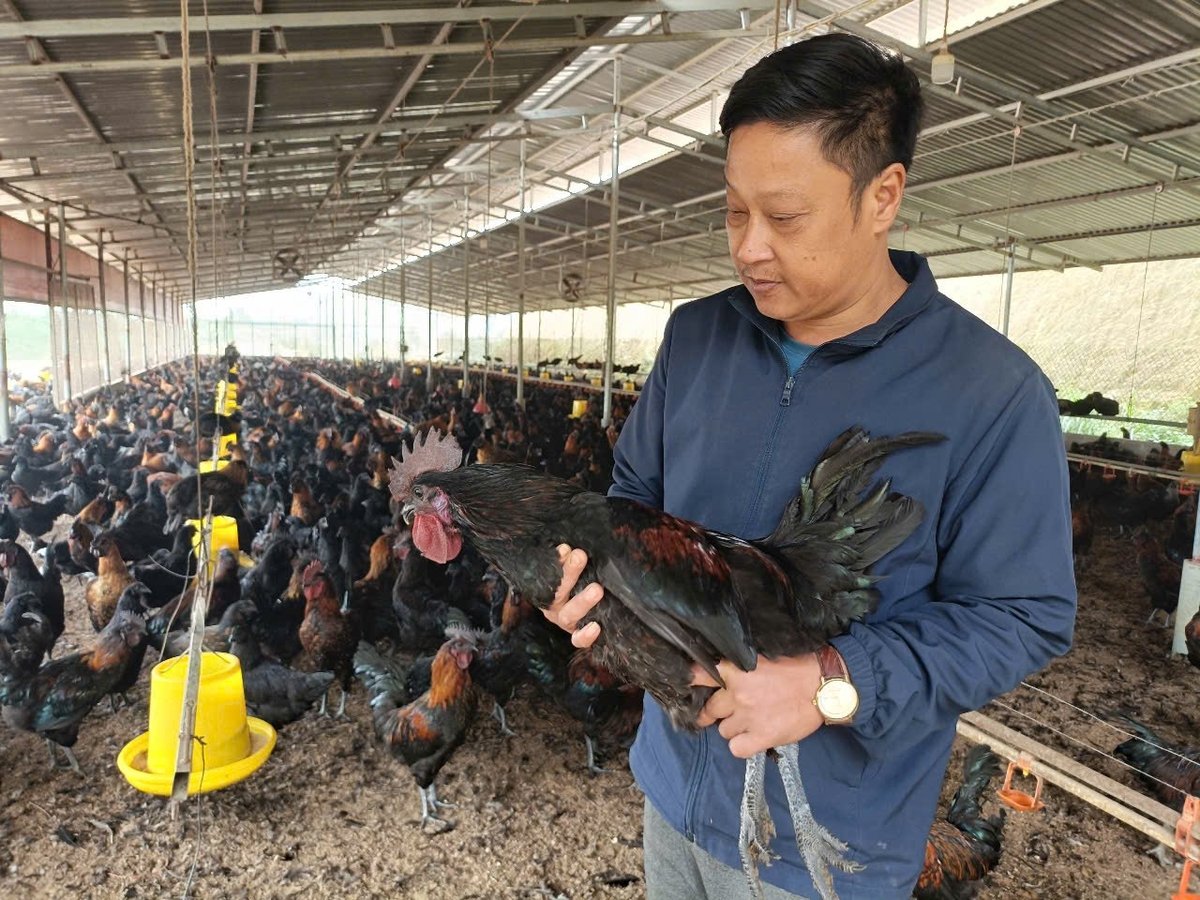
Nguyen Tien Son, Director of MQ Cooperative in a Mong chicken farm. Photo: Thanh Tien.
Apart from its members, MQ Cooperative has linked with more than 20 local chicken farming households to carry out chicken farming according to a standard procedure, from importing breeds and feed to choosing the right vaccines. The cooperative will then connect the focal point to underwrite all of the people’s output. Every member of the cooperative now has 2 - 5 barns. Each farm has a scale of 4,000 - 5,000 chickens/batch. The two chicken breeds selected are the No. 1 Mia chicken and the Mong chicken.
Son believes the breed is an important factor determining approximately 50% of the chicken farm’s success. To ensure the quality of the breed, MQ Cooperative chooses to sign with reputable breed production units.
Mia chicken breed batches include two types imported from Dabaco Breeding Chicken Company Limited (Dabaco Vietnam Group) and Tay Bac Breeding Chicken Company Limited (Dat Viet Biology Joint Stock Company). As for the Mong Chicken varieties, the cooperative uses the breed of the Center for Conservation of Livestock Breed (National Institute of Animal Science).
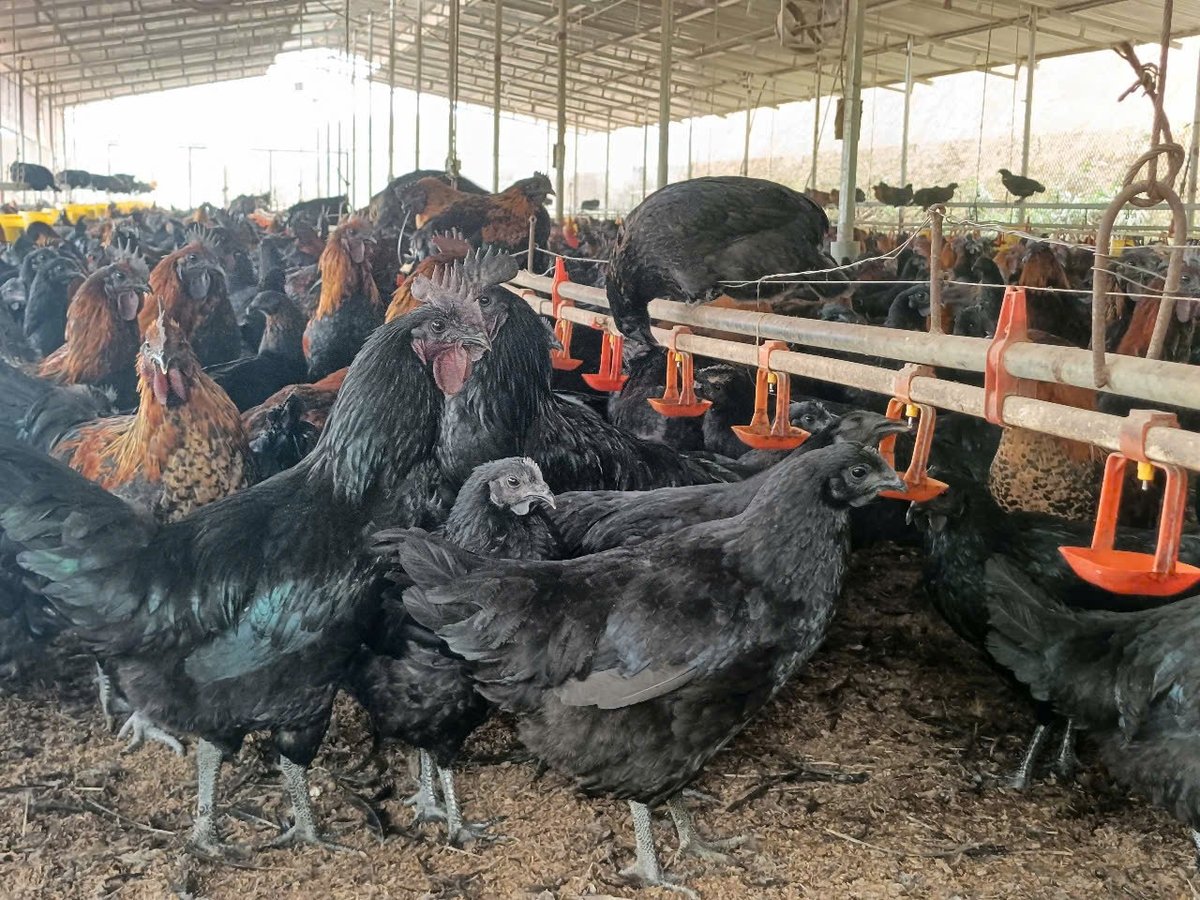
The cooperative signs a contract to supply hundreds of tons of chickens to the market every month. Photo: Thanh Tien.
The cooperative’s chicken farming areas are isolated from residential areas with many high hills, and having abundant water sources is an advantage. Most households have land funds, so the gap between farms is often calculated by the hills. It is convenient for the farmers to connect and support each other in the farming and disease prevention process. After selling each batch, farmers clean the barn, sprinkle lime, spray disinfectant, leave it for one month to kill the pathogens, and then re-herd.
Another factor that creates a brand for MQ Cooperative's chicken products is applying biosecurity. This cooperative focuses on creating a natural environment for chickens to grow and develop. There is a spacious playground on each farm so chickens can exercise and find more food. Many trees are planted around the farm to avoid the heat in the summer and stay warm in the cold seasons.
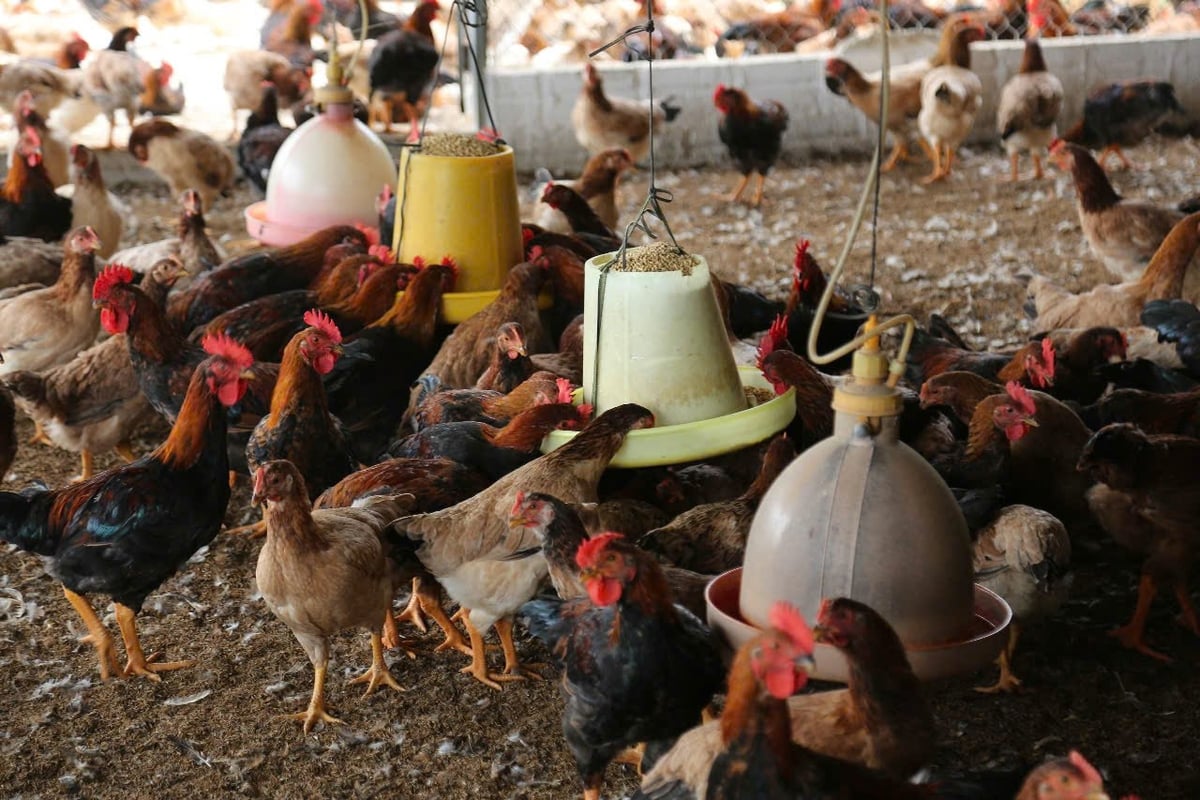
Each chicken, when sold, can help farmers profit VND 30,000 - 40,000. Photo: Thanh Tien.
Each month, the cooperative sold 60,000 - 65,000 Mia chickens and nearly 30,000 Mong chickens to the market, equivalent to an output of approximately 120 tons and 50 tons, respectively. The price of Mia chickens, according to the consumption contract, now ranges from VND 80,000 to 90,000 per kg, and Mong chicken costs VND 80,000 per kg. On average, each chicken brings a profit of VND 30,000 - 40,000.
Translated by Samuel Pham

(VAN) The Integrated Plant Health Management (IPHM) helps farmers in Quang Ngai increase rice production efficiently and sustainably.

(VAN) Developing low-emission cultivation technology packages, MRV system, strengthening multi-stakeholder cooperation are to realize the goal of low-emission crop production.
/2025/10/23/5928-2-194850_964.jpg)
(VAN) The 'Regenerative cocoa production to support livelihood development in Vietnam' (ReCoPro) project marks an important step toward sustainable cocoa production.

(VAN) Reducing antibiotic dependence in livestock production helps protect public health, enhance food safety, and promote sustainable agricultural development.

(VAN) Experts describe Viet Nam as a 'policy laboratory' within ASEAN, where new agroecological, green finance, and risk-management initiatives are being piloted before wider regional adoption.

(VAN) Limiting rice straw burning and reusing agricultural by-products as materials or fertilizers not only improves soil health but also helps clean the air.

(VAN) ASSET delivers long-term vision and strategy, innovative models, learning networks, policy impact, and measurable environmental benefits.